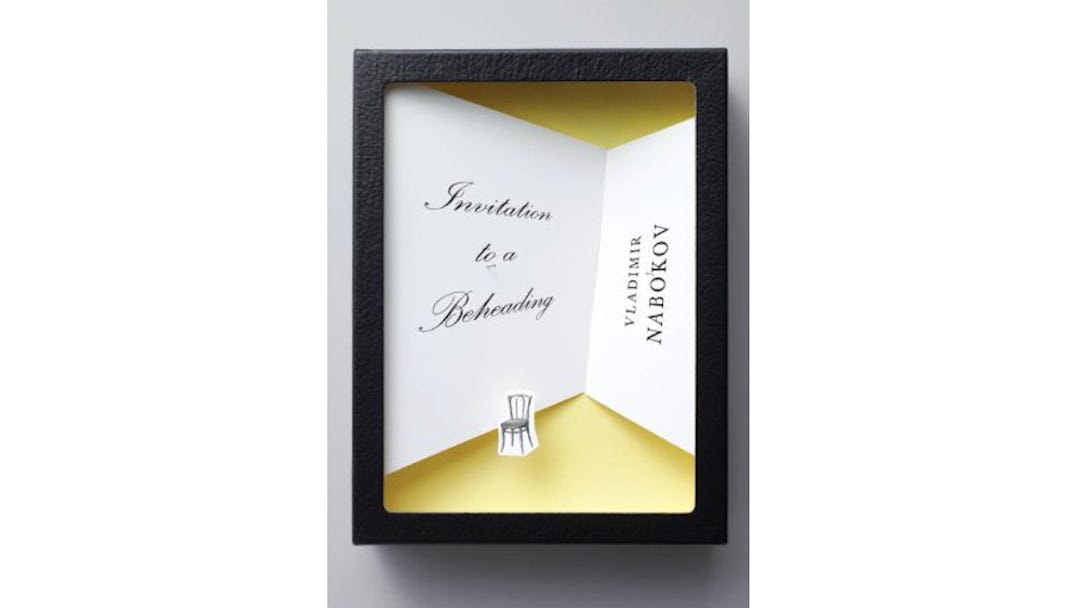Dystopian fiction has enjoyed a renaissance in these scary post-9/11 times, and the fact that The Hunger Games: Catching Fire is sure to destroy all competition at the box office is a testament to the fact that, weirdly enough, fiction set in some post-apocalyptic world run by some totalitarian government has occupied the same place in the current cultural zeitgeist as otherworldly monsters like vampires and zombies.
Although the books were initially written for teenagers, adults have helped make The Hunger Games a cultural phenomenon. Maybe the trilogy is not as iconic as George Orwell’s Nineteen Eighty-Four, Aldous Huxley’s Brave New World, or Ray Bradbury’s Fahrenheit 451 (all of which you should already have read), but it’s definitely required reading if you find yourself drawn to dystopian fiction. Here are some other great books that fall into that category.
Invitation to a Beheading, Vladimir Nabokov
You know it’s dystopian fiction when a person is imprisoned for a crime like “gnostical turpitude,” and the gloomy and gray world portrayed in Nabokov’s book — which is constantly compared to the work of Franz Kafka, despite the fact Nabokov claimed to have written it before reading any Kafka — will also be familiar to fans of the genre.
Caesar’s Column, Ignatius Donnelly
The end of any century is sure to inspire some brand of end-of-the-world anxiety. Even though Donnelly didn’t necessarily do a good job predicting what 1988 New York City would look like, it’s fascinating to see what a more general “Apocalyptic Utopia” looked like to authors in the later part of the 19th century.
The Iron Heel, Jack London
Jack London was a writer of very confused politics. The fact that he was a socialist didn’t mean he wasn’t prone to writing racist rants. Best known for books like White Fang, his 1908 novel tells the story of an America being taken over by a tyrannical government, and — for better or for worse — is a dystopian work concerned greatly with politics.
Day of the Oprichnik, Vladimir Sorokin
Russia is the sort of place that cries out for speculative fiction concerning its future, and in Sorokin’s brilliant novel, that future is a return to the past, with the Russian Empire once again ruling the country and dispatching its henchmen, the oprichnik, to do its dirty work.
Anthem, Ayn Rand
So you have a friend who really loves Ayn Rand and Objectivism, and you want to find some sort of literary common ground with them, but you don’t want to have to read doorstoppers like Atlas Shrugged or The Fountainhead. Well, you’re in luck, because Anthem is sort of like Nineteen Eighty-Four, except, you know, nowhere near as good. Still, if you’re going to read some Rand, this is the one we’d suggest. Bonus: it’s only 128 pages long.
The Trial, Franz Kafka
Most of us probably believe that the image of a man waking up as insect is the epitome of “Kafkaesque,” but it is the story of Josef K. and his unspecified crime, trial, and eventual punishment at the hands of a system that can do whatever it wants to whomever it wants that deserves the tag more than any of his other works.
The Slynx, Tatyana Tolstaya
Even though civilization as we know it has ended because of something called “The Blast,” that doesn’t mean the human race won’t continue. We just have to contend with freakish mutants and the return of serfdom. No bigs.
The Handmaid’s Tale, Margaret Atwood
Of the 6000 books Margaret Atwood has written, this novel in which America is finally taken over by religious crazies, with disastrous effects on gender relations in particular, is her dystopian masterpiece.
Do Androids Dream of Electric Sheep?, Philip K. Dick
Dick’s classic inspiration for Blade Runner is set in a time after nuclear war, and also one of those books you need to read even if you have already seen the film adaptation 25 times.
The Stars, My Destination, Alfred Bester
A book featuring a wired world where governments and big corporations run things without much accountability sounds like a cyberpunk novel from the 1980s (or the US circa 2013), but it isn’t. Bester’s mid-century classic is a great work of literary science fiction.
Zone One, Colson Whitehead
Whitehead’s bestseller gets pegged as a zombie novel a lot of the time, and while that’s fine, a story in which most of civilization has been wiped out and humans under military rule have to figure out how to deal with all of that is about as dystopian as it gets.
“Harrison Bergeron,” Kurt Vonnegut
No matter how much Vonnegut you’ve read, one theme stands out: humanity is screwed, and it’s all our fault. In this short story included in the collection Welcome to the Monkey House, Vonnegut explores the disastrous effects of declaring all people totally equal, a policy enforced by somebody dubbed Handicapper General.
A Canticle for Leibowitz, Walter M. Miller, Jr.
The only novel Miller published during his lifetime, this masterwork follows an order of Catholic monks centuries after nuclear war wiped out most of the population, who try to preserve all scientific knowledge for a time when they believe humanity will be ready for it.
Riddley Walker, Russell Hoban
Hoban’s brilliant novel explores a world in which a small portion of humanity survived a nuclear war, only to watch a ruling class comprised of the church and government keep the population under their boots as it repopulates, essentially losing all progress past the Iron Age.
Zazen, Vanessa Veselka
So much dystopian fiction takes place after the bombs have been dropped; what sets Veselka’s brilliant novel apart is that the action occurs right in the middle of everything falling apart.
